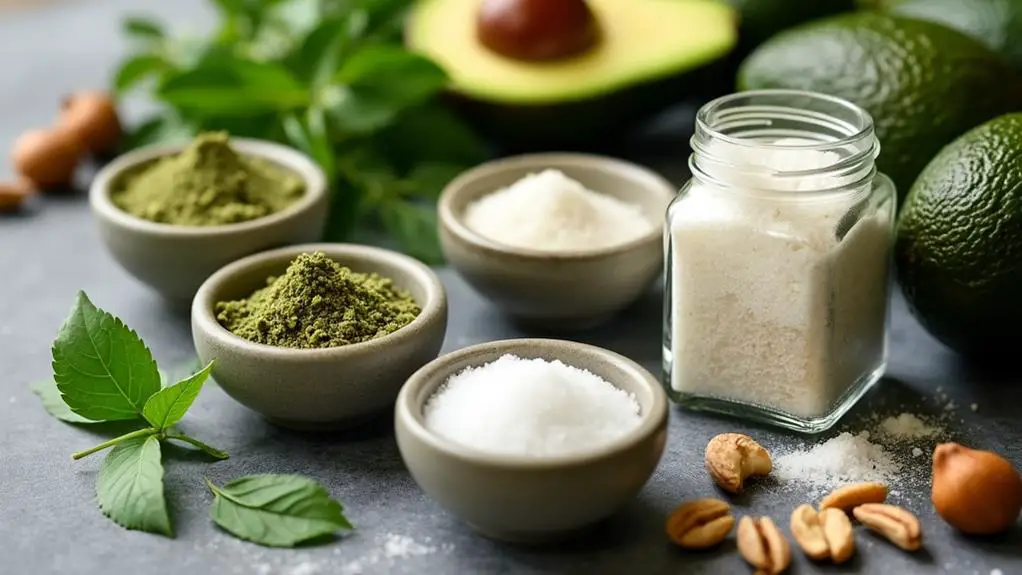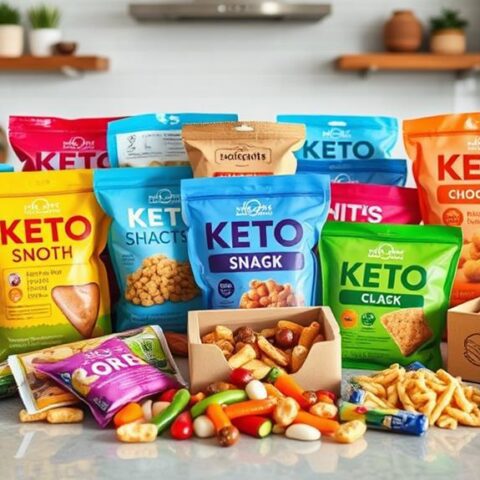
On a ketogenic diet, sugar intake should be minimized to nearly zero to maintain ketosis. The primary goal is to keep daily carbohydrate consumption between 20-50 grams, often targeting 20-30 grams of net carbs. This includes accounting for sugars hidden in processed foods, which could hinder ketosis. Instead, opt for keto-friendly sweeteners like stevia, erythritol, and monk fruit that do not affect blood sugar levels. Strictly managing carbohydrate and sugar intake is essential for achieving the diet's benefits, such as improved mental clarity and stabilized blood sugar. To fully grasp effective strategies, further exploration of this topic is beneficial.
Key Takeaways
- Keep added sugar intake to 0 grams daily to maintain ketosis.
- Total daily carbohydrate intake should range between 20-50 grams, based on individual tolerance.
- Avoid high-carb foods and processed snacks to sustain ketosis effectively.
- Use keto-friendly sweeteners like stevia, erythritol, and monk fruit as sugar alternatives.
- Regularly check ingredient labels to identify hidden sugars in foods.
Understanding the Keto Diet
Understanding the Keto Diet
The ketogenic diet, often referred to as the keto diet, is a scientifically-backed nutritional approach that emphasizes low carbohydrate and high fat intake to induce a metabolic state known as ketosis. The primary keto principle revolves around greatly reducing carbohydrate consumption—typically to 20-50 grams per day—while increasing the intake of fats to 70-80% of daily caloric intake. Proteins make up the remaining 10-20%.
This diet also advises avoiding high-carb breakfast foods and processed snacks to maintain ketosis effectively.
Achieving and maintaining ketosis is central to the keto diet. In ketosis, the body shifts its primary energy source from glucose (derived from carbohydrates) to ketones, which are produced from fats. This metabolic state not only facilitates fat burning but also provides a stable and efficient energy supply, particularly benefiting brain function.
One of the key ketosis benefits includes enhanced mental clarity, as the brain efficiently utilizes ketones as an energy source. Additionally, the reduction in carbohydrate intake helps stabilize blood sugar levels, minimizing insulin spikes and potentially aiding in weight management.
Understanding these keto principles is essential for effectively adhering to the diet and optimizing its numerous health benefits. This dietary shift necessitates a careful and deliberate approach to macronutrient balance to sustain ketosis and maximize its advantages.
Sugar's Impact on Health
Excessive sugar intake is strongly associated with various health issues such as obesity, type 2 diabetes, heart disease, and chronic inflammation, underscoring the necessity for moderation.
Refined sugars, devoid of essential nutrients, can cause rapid energy spikes and subsequent crashes, adversely impacting energy levels and overall well-being.
Reducing sugar consumption can greatly enhance cardiovascular health, lower the risk of metabolic syndrome, and improve oral health by decreasing the likelihood of cavities and tooth decay.
Additionally, lowering sugar intake can improve insulin sensitivity, which is vital for managing and preventing type 2 diabetes.
Health Risks of Sugar
Sugar consumption poses considerable health risks, particularly when intake levels are high. One of the most concerning issues is sugar addiction, where the brain's reward system is hijacked, leading to cravings and overconsumption. This can exacerbate metabolic effects, contributing to obesity—a condition affecting over 40% of adults in the United States. Obesity greatly increases the risk of type 2 diabetes and heart disease.
High sugar intake is also linked to chronic inflammation, which plays a vital role in the development of metabolic syndrome and cardiovascular diseases. Refined sugars contribute to insulin resistance, resulting in raised blood sugar levels and a heightened risk of developing type 2 diabetes.
Moreover, the regular consumption of simple carbohydrates can cause rapid fluctuations in energy levels, negatively impacting mood and cognitive function.
Additionally, a diet high in sugar is associated with an increased risk of dental issues. The fermentation of sugars by bacteria in the mouth leads to cavities and tooth decay.
Given these considerable health risks, it is essential to monitor and regulate sugar intake to promote overall health and well-being.
Reducing Sugar Benefits
Given the numerous health risks associated with high sugar intake, focusing on the benefits of reducing sugar becomes paramount. One significant advantage is weight management, as excessive sugar consumption is linked to obesity and metabolic syndrome. By employing dietary strategies that limit sugar, individuals can more effectively control their weight and reduce the risk of obesity-related conditions.
Improving blood sugar control is another critical benefit, particularly for individuals with type 2 diabetes. Reducing sugar intake can lead to decreased insulin resistance, thereby enhancing overall glycemic management.
In addition, cutting back on sugar lowers the risk of heart disease by mitigating inflammation and reducing heightened triglyceride levels, which are often exacerbated by high sugar diets.
Dental health also sees marked improvement with reduced sugar consumption. A diet low in sugar decreases the occurrence of cavities and tooth decay, problems commonly associated with sugary foods.
Moreover, minimizing sugar helps stabilize energy levels throughout the day, preventing the energy crashes that follow high sugar intake.
Combatting sugar cravings through thoughtful dietary strategies can consequently lead to sustained health benefits, making the reduction of sugar an essential component of a healthy lifestyle.
Calculating Carb Intake
To maintain ketosis on a keto diet, it is vital to limit daily carbohydrate intake to 20-50 grams, with many individuals targeting 20-30 grams.
Calculating net carbs by subtracting fiber from total carbohydrates is essential, as fiber does not affect blood sugar levels.
Additionally, monitoring blood glucose and ketone levels can provide valuable insights into personal carbohydrate tolerance, ensuring adherence to dietary goals.
Using tracking tools like MyFitnessPal or Carb Manager can simplify this process, making it easier to stay within the recommended carb limits.
Net Carbs Calculation
Understanding how to calculate net carbs is a vital aspect of managing a successful keto diet. Net carbs are determined by subtracting the fiber content from the total carbohydrates in a given food item. For instance, if a food contains 20 grams of total carbohydrates and 10 grams of fiber, the net carbs would be 10 grams. This calculation is essential because fiber sources, unlike other carbohydrates, do not raise blood sugar levels and therefore do not interfere with ketosis.
Individuals on a keto diet need to be vigilant about their net carb intake to maintain the metabolic state of ketosis. Typically, staying under 50 grams of net carbs per day is advised, though some may need to limit it further to between 20-30 grams based on personal tolerance.
When choosing keto snacks, it is important to examine food labels for both total carbohydrate and fiber content to accurately gauge net carb intake. High-fiber foods play a significant role by helping to offset carbohydrate intake.
Regular monitoring of net carbs allows for dietary adjustments, ensuring adherence to the keto diet's parameters and promoting sustained ketosis, which is key to the diet's effectiveness.
Daily Carb Limits
Managing daily carbohydrate limits is vital for maintaining a state of ketosis on a keto diet. Typically, daily carbohydrate intake is restricted to 20-50 grams, though individual tolerance can vary based on metabolic factors.
To determine net carb intake, it is important to subtract fiber from total carbohydrates, underscoring the significance of incorporating fiber sources into one's diet. Foods rich in fiber, such as vegetables, nuts, and seeds, help manage carb intake while promoting digestive health.
For the average adult, carbohydrates should constitute no more than 5% of total daily calories, translating to approximately 50 grams or less. Monitoring personal responses to different carbohydrate-containing foods through blood glucose and ketone level testing can provide valuable insights into individual carb tolerance.
This personalized approach guarantees that dietary adjustments can be made to maintain ketosis effectively.
In some cases, individuals may employ carb cycling, a strategy that involves alternating between low-carb and slightly higher-carb days to enhance metabolic flexibility and performance. However, this must be approached cautiously to prevent disrupting ketosis.
Tailoring carb consumption to individual needs is essential for sustaining ketosis and achieving peak metabolic health.
Hidden Sugars in Foods
Hidden sugars in foods pose a significant challenge for those adhering to a keto diet. Many unexpected items, such as salad dressings, pasta sauces, and condiments, can contain hidden sugars often labeled under different names like dextrose or high fructose corn syrup. This necessitates a high level of ingredient awareness and the ability to decode sugar labeling on food products. Recognizing hidden sugars can prevent unintended carb intake and support better dietary choices.
Moreover, seemingly healthy products like granola bars and yogurt may harbor substantial amounts of added sugars. This makes it essential for consumers to meticulously check nutritional labels to avoid inadvertent carbohydrate intake that could disrupt ketosis.
Foods labeled as "sugar-free" can also be misleading, as they might contain sugar alcohols or other carbohydrates that can impact ketosis if consumed in large quantities.
Even processed foods marketed as low-carb or keto-friendly can sometimes include hidden sugars that contribute to overall carbohydrate intake. As a result, staying vigilant about ingredient lists and recognizing alternative names for sugar is vital.
Sugar Alternatives for Keto

Given the prevalence of hidden sugars in many food products, finding suitable sugar alternatives is crucial for those committed to a keto diet.
Keto-friendly sweeteners such as stevia, erythritol, and monk fruit provide the necessary sweetness without the carbs, making them ideal for maintaining ketosis. Stevia, derived from the leaves of the Stevia rebaudiana plant, is a natural sweetener that has no calories or carbohydrates.
Erythritol, a sugar alcohol, contains just 0.24 calories per gram and is absorbed but not fully metabolized, thereby minimizing its impact on blood sugar levels. In addition, erythritol has a glycemic index of 0 and generally mimics sugar's taste and texture.
Monk fruit extract is another keto sweetener that is both natural and carb-free. Moreover, allulose, a relatively new entrant in the market, offers approximately 70% of the sweetness of sugar but with minimal impact on blood sugar levels.
These options can be particularly beneficial for creating low carb desserts, allowing individuals to enjoy sweet treats without compromising their keto regimen.
When selecting sugar alternatives, it is vital to check labels carefully to avoid hidden carbs and verify the products align with keto dietary requirements.
Opting for sweeteners labeled as zero carbs can help maintain the delicate balance needed for ketosis.
Tips for Reducing Sugar
Reducing sugar intake on a keto diet requires meticulous planning and a strategic approach to avoid disrupting ketosis. To maintain ketosis, it is vital to limit added sugar intake to 0 grams per day and keep total daily carbohydrate consumption between 20-50 grams, depending on personal tolerance.
One effective method is meal prepping, which allows for precise control over ingredients and helps reduce reliance on processed foods that often contain hidden sugars. Additionally, electrolyte management is essential as reducing sugar and carbohydrate intake can affect sodium, potassium, and magnesium levels.
Incorporating low-carb sweeteners such as stevia, erythritol, and monk fruit can help satisfy sweet cravings without affecting ketosis. These sweetener options provide the sweetness desired while maintaining low carbohydrate intake.
Staying hydrated with water or herbal teas can also aid in curbing cravings for sugary snacks and help maintain energy levels throughout the day.
Additionally, regularly checking ingredient labels is important for identifying hidden sugars in condiments and packaged foods, as many products contain unexpected sources of sugar.
Frequently Asked Questions
How Many Grams of Sugar Can You Have on Keto?
On a keto diet, it is advisable to consume 0 grams of added sugar, utilizing sugar alternatives instead. Be vigilant about hidden sugars in processed foods and maintain total carbohydrate intake under 50 grams to sustain ketosis.
What Should Your Sugar Level Be on Keto Diet?
The ideal sugar level on a keto diet should be minimal, with individuals closely monitoring levels to guarantee they remain in ketosis. Regular testing of blood glucose and ketone levels is essential for maintaining peak metabolic health.
What Happens if You Eat a Little Bit of Sugar on Keto?
Consuming even a small amount of sugar can disrupt keto adaptation by causing insulin spikes, increasing sugar cravings, and potentially knocking the body out of ketosis. This may hinder fat metabolism and delay the return to ketosis.
Will One Chocolate Bar Take Me Out of Ketosis?
One chocolate bar can potentially disrupt ketosis due to its high sugar content, leading to significant spikes in blood glucose levels. Managing chocolate cravings with low-sugar alternatives is essential to minimize adverse ketosis effects.
Conclusion
To summarize, adherence to a ketogenic diet necessitates meticulous management of carbohydrate intake, with a particular emphasis on minimizing sugar consumption. The impact of sugar on metabolic health underscores the importance of vigilance in identifying hidden sugars in foods. Employing sugar alternatives that align with ketogenic principles can aid in achieving dietary goals. Ultimately, a strategic approach to reducing sugar intake can facilitate the maintenance of ketosis and support overall metabolic health.










No Comments